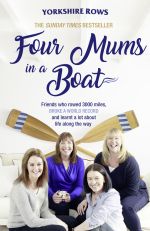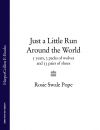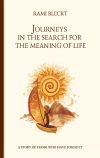Правообладателям!
Представленный фрагмент книги размещен по согласованию с распространителем легального контента ООО "ЛитРес" (не более 20% исходного текста). Если вы считаете, что размещение материала нарушает ваши или чьи-либо права, то сообщите нам об этом.Читателям!
Оплатили, но не знаете что делать дальше?
Текст бизнес-книги "Four Mums in a Boat: Friends who rowed 3000 miles, broke a world record and learnt a lot about life along the way"
Автор книги: Janette Benaddi
Раздел: Жанр неизвестен
Текущая страница: 1 (всего у книги 2 страниц)
JANETTE BENADDI is a 52-year-old businesswoman from Leeds. She is married with two children.
HELEN BUTTERS is an NHS communications expert from North Yorkshire. She is 46 years old, married and has two children.
FRANCES DAVIES is a solicitor running her own law firm in Leeds. She is 48 years old, married with two sons and lives in York.
NIKI DOEG runs her own business and is a qualified rugby coach. She is 46 years old and lives in York with her husband and their two sons.

Copyright

An imprint of HarperCollins Publishers Ltd.
1 London Bridge Street
London SE1 9GF
First published in Great Britain by HQ in 2017
Copyright © Janette Benaddi, Helen Butters, Niki Doeg and Frances Davies 2017
Janette Benaddi, Helen Butters, Niki Doeg and Frances Davies asserts the moral right to be identified as the author of this work.
A catalogue record for this book is available from the British Library.
This novel is entirely a work of fiction. The names, characters and incidents portrayed in it are the work of the author’s imagination. Any resemblance to actual persons, living or dead, events or localities is entirely coincidental.
All rights reserved under International and Pan-American Copyright Conventions. By payment of the required fees, you have been granted the non-exclusive, non-transferable right to access and read the text of this e-book on-screen. No part of this text may be reproduced, transmitted, downloaded, decompiled, reverse engineered, or stored in or introduced into any information storage and retrieval system, in any form or by any means, whether electronic or mechanical, now known or hereinafter invented, without the express written permission of HarperCollins.
Ebook Edition © January 2018 ISBN: 9780008214821
This book is dedicated to you. We hope itwill inspire you to conquer your own ‘ocean’,whatever it may be.
JANETTE, HELEN, FRANCES AND NIKI
‘You can never cross the ocean unless you have the courage to lose sight of the shore.’
CHRISTOPHER COLUMBUS
Contents
Cover
About the Authors
Title Page
Copyright
Dedication
Epigraph
Chapter 1 La Gomera
Chapter 2 Holding On
Chapter 3 The Beginning
Chapter 4 The Team
Chapter 5 Making It Happen
Chapter 6 One Step Forward
Chapter 7 Rose
Chapter 8 Back Home
Chapter 9 The North Sea
Chapter 10 The Final Countdown
Chapter 11 The Row
Chapter 12 Christmas
Chapter 13 Hurricane
Chapter 14 Flow
Chapter 15 Antigua
Chapter 16 Re-entry
Epilogue
The Letters
Photo Section
CHAPTER 1
La Gomera
‘To be is to do.’
SOCRATES
30 November 2015, San Sebastián Marina, La Gomera
‘This’, said Frances, shaking her head slowly as she stared at the waves smashing into the harbour wall below us, ‘is not an entry-level ocean.’
Standing next to her, looking at the violent swell just outside San Sebastián Marina in La Gomera, the rest of us – Janette, Helen and Niki – were inclined to agree. The waves were enormous and the distance we were about to row was substantial. Who on earth could have possibly thought this was a good idea? Collectively, we were about to leave four husbands, eight children, five dogs, two cats, two snakes and a gerbil and row 3,000 miles across one of the most dangerous oceans in the world. It is said that more people have travelled into space or climbed Mount Everest than have crossed the Atlantic in a rowing boat.
And not one of them, to be frank, was a middle-aged working mother from Yorkshire, firmly the wrong side of 40 (or 50), with little or (more accurately) no sporting prowess.
In fact, there was not a single Olympic athlete, extreme sportsman or endurance nut among the four of us. None of us had marched to a Pole or bivouacked on the side of a mountain or lived in a cave drinking nothing but rainwater with only a small rodent for company. That said, we weren’t totally unfit, sofa-bound sloths; Frances had done the Coast to Coast race from Nairn to Glen Coe, and Janette once did a 5-kilometre ‘fun run’ where she got covered in pink paint as she jogged around the grounds of Castle Howard. But essentially we were four mums who had met on the school run and decided to row an ocean.
And now, standing here, that decision to enter the Talisker Whisky Atlantic Challenge – one of the toughest races on earth – made after a few too many glasses of Pinot on a cold winter’s night in York back in January 2013, looked like a moment of total madness. It had taken us nearly three long, hard years to get to this day. We had always said to each other that the hardest part of the race, the toughest challenge, would be getting to the start line in the Canary Islands in the first place. And we’d managed that. We’d done the difficult bit. We’d raised the money, won over enough sponsors and managed to convince enough people that we were serious and worth backing. But now, here we were, staring into a cauldron of currents and tides, with hurricane-force winds and waves up to 60 feet high, not to mention the giant shipping tankers who could take out our little rowing boat at a moment’s notice. We were also trying hard not to think of the sharks, the whales and the marlins, which had been known to skewer through the hulls of boats in the middle of the night, plus the scorching hot sun, the driving rain, the injuries, the sores, the exhaustion and the endless, endless rowing. It would be two hours on, two hours off – eat, sleep, row, repeat – which we estimated we would need to keep doing for at least 50 days, or possibly a touch longer. We’d certainly need the emergency bottle of mango gin we were planning to squirrel into the hold.
‘It’ll be fine,’ said Helen with a rictus grin and an exaggerated shrug, just as another huge wave hit the rocks below. ‘We know we’ll make it to Antigua.’ She nodded.
‘We just all have to think positive,’ said Niki.
‘The strength of our team is each individual member. The strength of each member is our team.’ Janette was quoting from our ‘On-board Values’ sheet that she’d presented for our perusal and approval 3,000 miles away in Yorkshire.
Standing there, staring at those powerful waves, we were all desperately trying to be positive, think positive and breathe positive, whereas deep down we were all wondering: why the bloody hell have we decided to row across an ocean in the first place? We all knew there was a chance we wouldn’t make it across. But now was not the time to dwell on the negative. This was going to be life-changing. But we knew that. We were all in this adventure not to escape life, but for life not to escape us. And this was it. The sun was beating down, the salt air filled our nostrils; it was Helen who eventually broke the silence.
‘And’, she added firmly, ‘no one is allowed to cry.’
We arrived in La Gomera on the last day of November 2015, two weeks before the start of the Talisker Whisky Atlantic Challenge. The four of us were about to row 3,000 miles from our base in the Canary Islands over to Antigua in the West Indies. We’d been told that preparation was one of the most important parts of the race and we had been determined to get to the Canaries in good time to sort out and organise our stuff, and also to make sure that there would still be the necessary essential supplies left in the few shops on the tiny volcanic island.
BBC Breakfast had decided to film us leaving the UK, saying goodbye to our back-up team, friends (lots of friends), family (lots of family) and supporters at Manchester Airport. Out of the 26 teams making the Atlantic crossing this year they had chosen us – Yorkshire Rows – as the team to follow. We were naturally thrilled as we were desperate to make as much money as possible for our chosen charities: Maggie’s Cancer Care and Yorkshire Air Ambulance.
The TV cameras were rolling as we stood at the Thompson check-in to Tenerife, surrounded by friends, relatives and our piles of suitcases, packed with a water pump, bags of brazil nuts, wet-weather gear and chafe-free pants, hoping they wouldn’t make us pay for excess luggage, when we were approached by the strappingly good-looking former Olympic champion James Cracknell, who had famously rowed the same race with Ben Fogle, off the telly, some years before.
Exuding ebullient charm, he had been sent by the BBC as our surprise guest to see us off and deliver some last-minute pearls of wisdom. Unfortunately, no one had told Janette, and in the confusion of suitcases, faces and bright lights, she waved at him to move away.
‘Shhh,’ she warned, index finger in the air. ‘The BBC are filming over there.’
‘But –’ began James, looking a little confused.
‘Can’t you see the camera?’
Not recognising the handsome rower, Janette was convinced he was another competitor in the race.
‘They are trying to get their shots.’ She was squinting a little into the light. ‘Could you just keep quiet until they are finished.’
‘I was just –’ the handsome Cracknell ventured again.
‘Shhh,’ she replied.
Eventually, finally, Janette was introduced to her dashing interlocutor, and after red-faced, profuse apologies, James was allowed to deliver his final words to camera, which were that we would all hate each other one day and love each other the next, and that this would be a recurring pattern until we finished crossing the ocean. He warned us we’d have blisters where we never thought we could have blisters, and he added that he thought we’d make it, as we had all been through a far worse experience: childbirth.
With his encouragement ringing in our ears, we set off for the Canaries – our chafe-free pants securely in the hold and at no extra cost! On our journey to get to the Canaries we had been helped, not only very significantly by our families, but also by so many extraordinarily generous people along the way. One of these was 88-year-old Ron from Halifax, who owned a haulage company in Yorkshire and an apartment in Tenerife. He’d read about us in the Yorkshire Post and had contacted us via our fundraising website offering his services as our official meet-and-greeter in Tenerife. Having never met him before, we, of course, had no idea what to expect as this charming, diminutive elderly chap met us at the airport. Not only did he manage to pack all our hugely heavy suitcases into his car, but he also then proceeded to take us all out to lunch in Santa Cruz before depositing us at the ferry to catch the boat over to La Gomera island itself.
Less than an hour later and the marina at San Sebastián was buzzing with energy as we arrived. We checked in at the headquarters for the race and were handed our access passes to the harbour. As we made our way through the giant security gates at the harbour entrance, the first thing that hit us was the noise: shouting, chattering, laughter, the sound of sawing, blowtorches, hammers. There was so much work going on.
‘Is anyone else feeling nervous and excited?’ asked Niki.
‘I can’t believe we’re here,’ said Helen.
‘I can’t believe we’ve got this far,’ added Janette.
‘At last,’ smiled Frances.
There were crews of rowers for the race everywhere, boats lined up alongside each other. The teams were from all over the world: pairs, solo rowers and, like us, other teams of four. There were 26 teams in total, all preparing for the race and wandering up and down the jetties. Their huge piles of kit, ropes, buckets, grab bags, water pumps, drogues, sea anchors, radios, flares and first-aid kits were strewn about the wooden planks in a form of very ordered chaos, ready to be scrutinised by the race organisers – a painstakingly precise process in which each and every piece of equipment is checked, along with the competitor’s ability to use them. It is not only an inventory of the boat; it also tests her and the team’s seaworthiness. Anyone failing this process is not allowed to race.
Bang in the middle of it all was Rose – our beautiful Rannoch ocean-going racing boat and very much the fifth member of the team – 8 metres long and 1.5 metres wide, and glowing white in the sunshine. We were so eager to see her we picked our way through the teams to find her. We had missed her since she’d been packed onto a cargo ship and sent south two months earlier. Finally we spotted her, sleek and shiny with new Glide Coat paint to help her speed through the Atlantic. She was moored up next to a bold green boat powered by the only other all-female crew in the race – Row Like a Girl. We immediately climbed aboard and, like concerned parents, began to check her over just in case she had been knocked or bashed about on her journey. Fortunately she was perfect. In fact, compared to a lot of the boats in the marina she looked fabulous.
‘Not to be rude,’ whispered Helen, looking up and down the line of boats, ‘but none of these other boats are a patch on Rose!’
‘You’re right,’ confirmed Niki, also up on deck. ‘Rose is one of the more modern boats here.’
But it wasn’t just the age and size of the boats that differed; it was what the other crews had done to them. As we wandered up and down the jetties, chatting to the other crews and introducing ourselves, it became apparent that quite a lot of the other teams had effectively ‘pimped their rides’.
‘The Antiguans have got a little cooker,’ said Janette. ‘They’ve taken out one of their rowing seats and put it in the middle.’
‘They’ve got rods as well,’ added Niki. ‘Apparently they’re planning to fish their way across.’
‘Fish?’ asked Helen.
‘They’ll get there when they get there, or that’s what they’re saying,’ continued Niki, looking extremely perplexed.
‘Team Beyond are taking gallons of olive oil to drink,’ shared Frances.
‘Doesn’t that give you diarrhoea?’ asked Helen.
‘Ocean Reunion have packed masses of peanut butter in a bag!’
As we went up and down the boats, checking everyone out, we began to seriously doubt our preparation. Did we need a little cooker? Should we be fishing? Eating peanut butter, while glugging back the olive oil? What were we doing? What were we thinking? We didn’t belong here, among this group of extreme athletes. We were four mums from Yorkshire who really didn’t have any idea.
‘Enough is enough,’ declared Frances firmly. ‘We’ve done what we’ve done and we’re here now. Let’s get on with it.’
With so many rowers, support crews and race organisers crammed onto such a small island, accommodation was at a premium. Fortunately, Janette had been to La Gomera the year before with her husband, Ben, on a recce for the team. So she’d tested out some of the restaurants and truffled out a couple of bars. She’d even spotted a glamorous five-star hotel high on the hill that she’d fancied for the trip, but Frances had other ideas and found a distinctly less salubrious but certainly more practical apartment for the four of us to hole up in until the rest of our families arrived to wish us well before the start of the race.
An estate agent might have generously described the first-floor apartment as ‘characterful’. Helen optimistically described it as having ‘Spanish charm’, but then she had managed to secure the best bedroom – or perhaps that should be the only bedroom – with a double bed and a large wardrobe, right next to the bathroom. Janette ended up on the sofa bed in the lounge, while Frances and Niki slept in the ‘attic’ – a mezzanine open to the elements. They were forced to pee in buckets (much to the amusement of the neighbours), as climbing down the rickety ladder in the middle of the night was not an ideal way to avoid injury. And we could not afford injuries. Not now. Not after all our hard work, when we were so close to the race itself.
On our first night, we had a meeting about how much kit we should take onto the boat. Obviously, the more kit we had, the heavier the boat and the more slowly we would be able to row. It was in our interest to keep everything to a minimum. There were essentials like the spare rudder and the hand-operated watermaker that simply could not be left behind, but Helen’s hair straighteners and family-sized glitter shower gel were certainly being sent back home before the race with her husband, Richard, as they were strictly a La Gomera ‘essential’ only. As indeed, it appeared, were our pants.
‘We only really need two pairs,’ announced Janette.
‘Two?’ asked Niki.
Janette nodded. ‘We have to start somewhere, so it may as well be the knickers. We won’t be wearing them anyway.’
‘Why only two?’ asked Helen.
‘The weight.’
‘Knickers don’t weigh very much,’ continued Helen.
‘I know, but added to everything else you want, you’ll end up with a boat so heavy we can’t row.’
‘There are probably bigger and heavier items we should be arguing about. Like snack packs.’
Niki flinched. During the long build-up to the race we had each, at various different times and stages, been assigned roles or duties. And Niki had been placed in charge of snack packs. It was one of the many jobs she is well suited to. For, despite the fact that she is slim and as svelte as you like, she likes her food. She has an extremely fast metabolism and when she is not eating, she is quite often thinking about what she might want to be eating next. So she was the logical person to put in charge of food, particularly snacks.
Sufficient calorie intake on such a strenuous and mammoth journey is, needless to say, essential, and Niki researched her task impeccably with the razor-sharp precision that she brings to everything. Rules of the challenge stipulate that each boat must carry 60 days’ worth of rations per person, and with us burning anything between 6,000 and 10,000 calories a day, we obviously needed a lot of meals and plenty of snacks in between them. In fact, we’d been told that as the high-calorie ration packs themselves would soon bore us into not bothering or wanting to eat anything, the snacks were more than a treat; they could end up keeping us going through an especially long night out at sea or a miserable moment of depression, and could therefore end up saving our lives. And Niki had definitely investigated all avenues and scenarios. She had gone through what we should bring, and what could survive the sweaty, salty, damp journey. She had asked us what we liked, and what we might want to eat in the middle of a force-eight gale. Unfortunately, when Niki had emailed us all, none of us had really focused on her question.
‘We don’t mind,’ we all said politely. ‘It’s up to you.’ Turns out that was a decision we would certainly live to regret.
Janette’s kit cull was ruthless, and knickergate rumbled on with talk of a mutiny and a plan to stash a secret bag of pants on the boat. But our overriding memory of those first few days as we tinkered with our boat, stuck the names of our sponsors on Rose’s hull and ran through the list of essentials we needed to find space for on-board was the incredible ‘can-do’ attitude of the other competitors. It was truly a different world.
We were moored up next to Row Like a Girl – a fantastic group of stunningly attractive women who were, frankly, young enough to be our daughters. They were bright and capable and had bags of adventurous sporting experience behind them.
‘Even if I lost two stone I’d never look like that,’ said Janette, watching the girls slap on some suntan lotion. Further down the jetty, a couple of the other crews started wolf whistling at the girls. ‘I’m not sure we’d get the same reaction,’ she mused.
‘No,’ agreed Frances. ‘In fact, I’d say quite the opposite!’
We spent those early days racing around town, trying to find a chandlery to buy ropes and pads for seat covers, while chatting to the girls next door – Olivia, Gee, Bella and Lauren.
‘Yoga mats make the best seat padding,’ suggested Lauren helpfully, from the deck of her boat.
‘Really?’ said Helen.
‘They’re nice and soft – good for the bottom,’ she added.
It transpired, as we readied our boats and covered our hull in the sponsorship stickers, that Lauren had already tried and failed to cross the Atlantic two years previously as part of a double, with her teammate Hannah Lawton. Having suffered some of the worst conditions ever experienced in the race’s history, she’d ended up capsizing, losing all power to her boat and drifting for 40 days in the ocean. She spent a total of 96 days at sea before returning to the UK some 111 days after she started, having been rescued by a cargo ship en route from Canada. The fact that she was back here again, to exorcise her demons, was extraordinary. And her story was a salutary one. Enough to cut through the bravado as we coiled ropes on deck. And enough to make us all think quietly about exactly what we were letting ourselves in for. What were we doing, leaving eight children, with ages ranging from 8 to 18 years old, behind in Yorkshire? Were we being selfish? Insane? Can women of a certain age with jobs and responsibilities really go off and have an adventure? Are they allowed? Who on earth did we think we were?
Amazingly, no one here asked us those questions. No one ever asked what we were doing. Or who the hell we thought we were. Or questioned our motives. They merely accepted that we were. We could not help thinking as we moved among these extraordinary can-do people who encouraged us, rather than discouraged us, that there really should be more of them in this world. It is a rare feeling of empowerment for a woman, not to be judged.
Having said that, the inspirational crew Row2Recovery – a four made up of single – and double-amputee soldiers: Cayle, Lee, Paddy and Nigel – did once give us ‘the look’, like we had no idea what we were doing. In their defence, we were playing the uplifting anthem ‘Let It Go’ from the kids’ movie Frozen at full volume at the time as we cleaned the boat. They moaned, groaned, covered their ears and begged us to turn it off – just as Greg Maud, a solo rower who’s climbed Everest and Kilimanjaro and completed the Marathon des Sables, loudly joined in on the chorus as he walked past, his arms outstretched as he sang.
‘LET IT GO-O-O! LET IT GO-O-O!’ He paused. ‘What can I say?’ He shrugged at the appalled faces of the Row2Recovery team. ‘I have a daughter.’
As race day edged a little closer, so the atmosphere in the town got a little headier; the tension increased, as did the amount of gins consumed in The Blue Marlin.
The unofficial race bar, The Blue Marlin – a tiny watering hole in a side street of La Gomera whose walls are graffitied with the last words of adventurers past – was where all the rowers and their support teams would gather after a long, hard day of packing and repacking their boats. A veritable hub of all things transatlantic and rowing, it smelt of salt and spilt beer and was the place where friendships were formed and hangovers were made. As the days ticked by, the talk turned from past adventures, tall waves and tall stories to the present. We’d talk in intense detail about how to distribute the weight properly around the boat, how to deploy a para-anchor (a giant parachute of an anchor used in storms to stop the boat being blown around in the sea) and when exactly you should launch a drogue (in very rough seas and currents, apparently). Later in the evening, as a few more rums slipped down, the singing and the guitar playing became a little louder and would sometimes carry on until two or three in the morning.
Frances was in her element. Having been at university in Southampton, she was right back there, loving every minute, reliving her student days. Normally quite reserved, she was now talking to all the competitors, thriving on everyone’s positive attitude. Of course we were all going to make it across! Of course it was possible! Of course! Of course!
There was the small matter of passing our scrutineering test first. We knew the race organisers would not allow a boat into the water until it had passed this very intensive check. Every tiny piece of kit, from survival suits to safety lines right the way down to the number of plasters in the medical kit, had to be laid out in a particular format next to the boat and checked off the 11-page list of mandatory kit. The day of our final scrutineering was nerve-racking. It took us nearly the whole day to lay everything out by Rose. Would we have all the kit? Were the ropes the right diameter? Did we have the right splint in our medical kit? Will our daily food packages have enough calories in them? All the other crews were obviously in the same boat, so when someone was missing something or needed something there was a lot of sharing – things were flying from one boat to the next and the sense of community spirit was fantastic. Everyone was willing to help out others. It was inspiring.
However, keeping occupied while Lee from Atlantic Campaigns slowly and methodically went through the kit was a nightmare.
‘Shall we just pace up and down on the quayside?’ suggested Helen.
‘Go for a cup of coffee?’ asked Frances.
‘I’m too nervous,’ said Niki. ‘What if we’re missing something?’
Eventually we took it in turns to answer Lee’s questions, otherwise the two or so hours he spent going through each tiny item of kit would have been excruciating. Our hearts were pounding. Our mouths were dry. Eventually. Finally. At last. We passed! Never before has a group of four working mothers been so thrilled to have sourced 35 sticky plasters in their lives! We were race-ready and could launch Rose. We booked a slot the next morning to get her into the water.
We were on a high. Nothing could hold us back now.
However, our first practice run out with Rose was a different story. The rules of the challenge stipulate that you must have at least 24 hours of sea experience in the boat before heading off, and even though we had already ticked that box, we were keen to know what she felt like in the Atlantic. How would she handle? How would she feel? It was also a good idea to run through a few manoeuvres – like getting the watermaker going – while we still had time to make any adjustments on the luxury of dry land. Anything that went wrong once we’d started the race would have to be fixed at sea. And we all knew how difficult that would be. So any problem we identified now would, in theory, be a bit of a bonus.
Less than an hour outside the harbour wall the first fly in our ointment became apparent: Helen. The seas were big, the waves were choppy and coming at us from all angles, and the boat was bouncing around like a ping-pong ball in a Jacuzzi. We’d been warned that for the first few weeks out of La Gomera the sea would be fast, furious and terrifying, but we had only just left the harbour and already the ocean was throwing us around like a toy.
‘I’m going to be sick,’ announced Helen as she deposited her breakfast down the side of the boat.
‘And again.’ She hurled.
Poor Helen suffers from chronic seasickness, which is not an ideal affliction in an ocean rower. We all knew she suffered from it and we had discussed it many times before. She wasn’t the only one. Frances was not immune to the odd vomit either, but the difference between the two of them was that when Frances was sick, she felt better and was able to continue rowing. She would simply pause mid-stroke in order to throw up over the side of the boat and then carry on. Whereas Helen was out cold. Helen could not move, she could not row, she could not get out of the cabin. All she could do was lie there, making strange lowing noises like a cow about to give birth, unable to sit up, speak or swallow.
And she tried everything: pills, potions, ginger pegs… She’d even been given, in case of great emergency, a seriously strong anti-emetic, that a doctor friend of ours, Caroline Lennox, had suggested we pack should we desperately need it. Helen had shown it to the handsome, God-like race doctor, Thor Munsch, who advised against taking it. His counsel was simple. She was going to be sick; she should go with it until it was out of her system, and then she would be fine. But Helen was desperate to find a remedy. Today she was trying out a special pair of ‘travel shades’ that blocked vision in one eye, which the company who had provided them said might do the trick.
‘They are not working,’ she said, declaring the obvious as she held onto the side, retching. ‘All that is happening is that I’m being sick while looking out of one eye!’
She turned to look at Janette, who was steering the boat as Frances and Niki rowed. It was tempting to laugh. She was clinging onto the side of the boat, her long brown hair all over the place, wearing a pair of glasses with a patch over one eye. The effect was faintly ridiculous.
‘I’m going back to the Stugeron travel sickness tablets,’ she announced as she vomited again and disappeared back down into the tiny cabin below.
The problem with having a member of the crew completely incapacitated with seasickness is twofold. Not only do the rest of the crew have to pick up the slack, which is impossible when there is simply no room for passengers on a small boat in the middle of a race to cross the Atlantic, but also if the boat is in danger and all hands are needed on deck then our power to deal with a difficult situation and our capacity to row ourselves out of trouble are severely diminished.
And it wasn’t long before that happened. About an hour and a half into our practice the winds, the waves and the currents suddenly turned against us and we were heading towards the rocks just outside the harbour.
‘One! Two!’ Janette was urging Niki and Frances to dig their oars in deep to help turn the boat away from the rocks. The waves were slapping at the boat from all angles, drenching us. ‘Pull!’ she yelled, tugging on the rudder, trying to keep the boat from careering towards the collection of sharp black rocks just visible above the foam.
‘Helen!’ yelled Janette. ‘Helen! We need you! We’re heading for the rocks!’
Then, ‘Helen, will you get on those oars, or we are going to crash into those rocks!’
And, ‘Helen, if you don’t come out now and help us, we’ll all die. Row or die!’
There was a seriousness in her voice. The idea that we could have come all this way only to smash the boat to pieces, or at the very least severely damage the hull, before the race had even started would be such a waste.
Правообладателям!
Представленный фрагмент книги размещен по согласованию с распространителем легального контента ООО "ЛитРес" (не более 20% исходного текста). Если вы считаете, что размещение материала нарушает ваши или чьи-либо права, то сообщите нам об этом.Читателям!
Оплатили, но не знаете что делать дальше?







